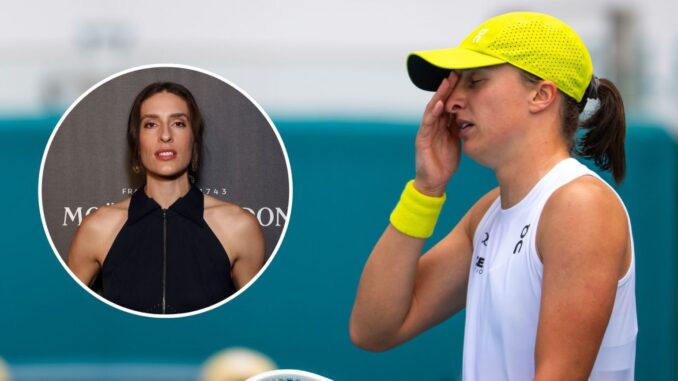
In the high-stakes world of professional tennis, where every swing and strategy can define a career, Iga Swiatek, the Polish powerhouse and current world No. 2, finds herself at the center of an intriguing puzzle. A former Grand Slam semi-finalist, Andrea Petkovic, has recently voiced her bewilderment over what she describes as a “very strange” issue plaguing Swiatek’s game, particularly as the clay court season looms on the horizon. With five Grand Slam titles under her belt, including four French Open victories, Swiatek’s dominance on the red dirt is legendary. Yet, Petkovic’s observations suggest that something unexpected is throwing a wrench into the 23-year-old’s otherwise impeccable performance against the sport’s elite, leaving fans and analysts alike scratching their heads.
Petkovic, a seasoned veteran who once reached the semi-finals of the 2014 French Open and peaked at No. 9 in the world rankings, has turned her keen eye to Swiatek’s recent struggles. Speaking on a popular tennis podcast, she didn’t hold back her confusion. “Iga Swiatek has developed a very strange problem against the best players in women’s tennis,” Petkovic remarked, her tone a mix of admiration and puzzlement. This isn’t about Swiatek’s raw talent—her athleticism, precision, and mental fortitude have carried her to the top of the game. Instead, Petkovic points to a curious pattern emerging in the latter stages of tournaments, where Swiatek seems to falter against top-tier opponents in ways that defy her usual brilliance.
The 2025 season has been a rollercoaster for Swiatek. Despite her stellar reputation, she has yet to reach a WTA Tour final this year, even after competing in five quarter-finals. Her campaign kicked off with a heart-wrenching near-miss at the Australian Open, where she was one point away from the final before falling to Madison Keys in a gripping three-set battle. Losses followed in Doha to Jelena Ostapenko, in Dubai to Mirra Andreeva, and again to Andreeva in Indian Wells. The most shocking defeat came at the Miami Open, where 19-year-old Alexandra Eala stunned the tennis world by ousting Swiatek in the quarter-finals. These setbacks have painted a picture of a champion grappling with an elusive challenge, one that Petkovic finds both fascinating and perplexing.
Reflecting on her own days on the tour, Petkovic offered a glimpse into the mindset of facing top seeds. “When I was unseeded at Grand Slams and pulled a seeded player—say, Serena Williams or Caroline Wozniacki in the first round—the locker room chatter was always the same,” she recalled. “Someone would ask, ‘Andrea, who are you playing?’ I’d say Serena, and they’d reply, ‘Oh, better in the first round than the quarter-finals.’ And you’d think, ‘Yeah, she’s probably sharper later on.’” For Petkovic, this logic doesn’t quite explain Swiatek’s current predicament. The Pole’s early-round dominance remains intact, but as tournaments progress, something shifts—leaving her vulnerable against the very best.
What makes this “strange problem” so confounding is Swiatek’s track record. Her clay court mastery is unrivaled, with a 95% win rate at Roland Garros and a knack for dismantling opponents with her technically astute forehand and relentless backhand. Yet, this season’s string of losses suggests a mental or tactical hiccup that surfaces when the stakes are highest. Is it the pressure of maintaining her No. 1 ranking, which she relinquished to Aryna Sabalenka late last year after a doping suspension? Or perhaps the transition to a new coach, Wim Fissette, after parting ways with Tomasz Wiktorowski, has introduced an adjustment period? Petkovic doesn’t speculate on the cause, but her confusion underscores the mystery: how can a player so dominant stumble so consistently against top competition?
As the clay season approaches, all eyes are on Swiatek to see if she can unravel this enigma. The French Open, where she’s won four of her five Majors, looms as both a proving ground and a potential redemption arc. Petkovic’s commentary has only heightened the anticipation, framing Swiatek’s journey as a compelling narrative of resilience and reinvention. Will she silence the doubters and reclaim her throne, or will this “very strange” problem continue to haunt her? For now, the tennis world watches, waits, and wonders—captivated by a champion at a crossroads.
Leave a Reply